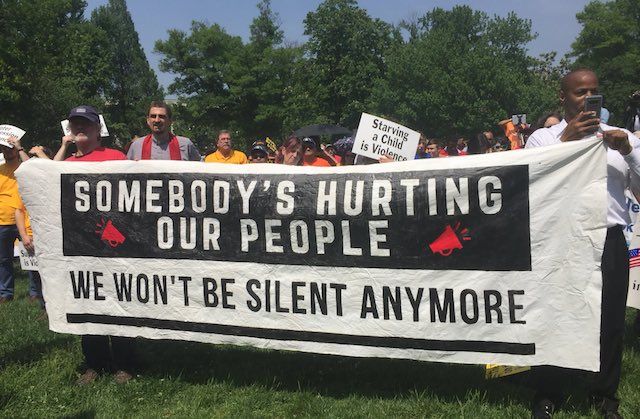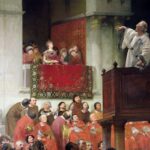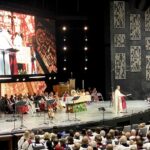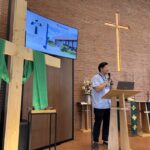On Saturday, June 23, an estimated 10,000 protesters gathered at the nation’s capital to advocate on behalf of those living in poverty, immigrants, refugees, underprivileged voters, and prisoners. Many liberal Mainline Protestant agencies participated, sharing the demonstration’s statist political priorities.
The gathering was attended by hundreds of Episcopalians after the church adopted a resolution in January 2018 to “acknowledge the unfinished work of the 1968 Poor People’s Campaign.” Included in the resolution was the church decision to “recognize these issues of poverty and justice severely affecting our domestic and global brothers and sisters and commit to ministry of active engagement, advocacy, and support throughout the Episcopal Church.”
Among the organizations that have promised to support this campaign are the Presbyterian Church (USA), National Council of Churches, Progressive National Baptist Convention, and the United Methodist Women (UMW) agency.
Fifty years ago, Martin Luther King Jr. began the first Poor People’s Campaign, inviting several church denominations to participate, but many declined, including the Episcopalians. The Rev. Melanie Mullen, Episcopal Church Director of Reconciliation, Justice and Creation Care, described some of the reasons they have accepted the challenge of moral revival this time around.
“We want to be able to encourage and educate our lay people, our people in the pews, on how to live faith in public life,” explained Mullen. “We also want to create a new paradigm for what it means to be clergy.”
Episcopal Church Presiding Bishop Michael Curry made a virtual appearance on a big screen during the event on the National Mall in D.C. Curry helped put into focus the mission statement of the Poor People’s Campaign. Sounding akin to a civil rights activist, he talked about how collectively the group should strive for “a nation where racism does not stain our moral character, where bigotry is not heard of seen any more in our land. Where injustices of the past are righted by making a new future… We must make possible the day that will come when no child will go to bed hungry in this land ever again.”
In a similar way, the first campaign was created by Dr. King to shed light on civil injustices. However, this new movement does not want to be in commemoration of the initial one. Co-organizer of Saturday’s march, The Rev. William Barber, told the Washington Post that “It is not a commemoration of what happened in 1968 but a reengagement of that because of the times in which we live.”
Barber, an ordained Christian Church (Disciples of Christ) clergyman, gave a talk critiquing “the war economy and militarism” as at the center of interlocking injustices during an impassioned May 8 address at historic New York Avenue Presbyterian Church in Washington, D.C. Barber has been a prominent figure on the Religious Left, offering a keynote address at the 2016 Democratic Convention and leading the “moral Mondays” protests during his time as North Carolina NAACP president.
A polarizing figure, Barber’s role confirmed to critics this latest Poor People’s Campaign is not apolitical or merely “moral” but a cause of the political left. It climaxed a forty day, nonviolent, civil disobedience, focusing on issues ranging from systemic racism to ecological degradation. More than 300 people were arrested during the allotted time period, and eighty-three year old Louise Brown was among them. Brown organized a Charleston march alongside King for PPC and was arrested while doing so then, as well. Being jailed did not phase her and she believes she is “encouraged and obliged to go to jail for what [she] feels is right and unfair.”
No doubt the latest Poor People’s Campaign was earnest but it arguably lacked the moral urgency of Martin Luther King’s 1960s advocacy. “This movement is a long-term campaign, not a one and done,” said the Rev. Glenna J. Huber, Rector of the DC Church of the Epiphany, at the march. “It’s not for the weak or the faint hearted, not all are called to be arrested or take action, but all are called to pray, and all are called to witness.”
But critics will surmise that only liberal church and other likeminded advocacy groups joined because this Poor People’s March stressed government solutions over the types of more direct moral renewal in which churches should specialize





Comment by MarcoPolo on June 30, 2018 at 4:15 pm
Thank God, wherever She is!
This movement is even more relevant today, than when it first began. Going to jail for Justice is a noble, honorable and patriotic thing to do.
All hail those, whose hearts and souls still stand against the inhumanity to Man!
Comment by Skipper on July 4, 2018 at 8:39 am
Funny they call for “Moral Revival” when they can’t stand much morality themselves. Most of these groups promote sexual confusion, for example, and wouldn’t even want anyone to be healed. Don’t expect to find support for the sanctity of life here. Perhaps their call for more government action is an attempt to clear a guilty conscience.
Time comes when we all need to turn back to God and do things His way. Ecclesiastes 12:13 NKJV “Fear God and keep His commandments, for this is the whole duty of man.”